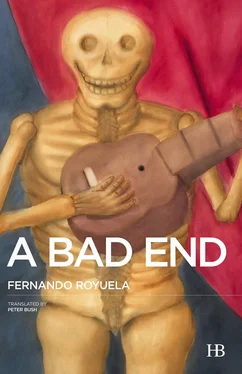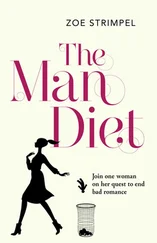Fernando Royuela - A Bad End
Здесь есть возможность читать онлайн «Fernando Royuela - A Bad End» весь текст электронной книги совершенно бесплатно (целиком полную версию без сокращений). В некоторых случаях можно слушать аудио, скачать через торрент в формате fb2 и присутствует краткое содержание. Год выпуска: 2016, Издательство: Hispabooks, Жанр: Современная проза, на английском языке. Описание произведения, (предисловие) а так же отзывы посетителей доступны на портале библиотеки ЛибКат.
- Название:A Bad End
- Автор:
- Издательство:Hispabooks
- Жанр:
- Год:2016
- ISBN:нет данных
- Рейтинг книги:3 / 5. Голосов: 1
-
Избранное:Добавить в избранное
- Отзывы:
-
Ваша оценка:
- 60
- 1
- 2
- 3
- 4
- 5
A Bad End: краткое содержание, описание и аннотация
Предлагаем к чтению аннотацию, описание, краткое содержание или предисловие (зависит от того, что написал сам автор книги «A Bad End»). Если вы не нашли необходимую информацию о книге — напишите в комментариях, мы постараемся отыскать её.
A Bad End — читать онлайн бесплатно полную книгу (весь текст) целиком
Ниже представлен текст книги, разбитый по страницам. Система сохранения места последней прочитанной страницы, позволяет с удобством читать онлайн бесплатно книгу «A Bad End», без необходимости каждый раз заново искать на чём Вы остановились. Поставьте закладку, и сможете в любой момент перейти на страницу, на которой закончили чтение.
Интервал:
Закладка:
Some women don’t try to hide it for one moment when they’re freeing up the seams of their knickers from between their buttocks. They do so on purpose, cheekily, to arouse the dirty passions of the men looking on in amazement. Animal language takes on all forms. The striking — snap! — of elastic on thigh is a beautiful sound, which, apart from stimulating the imagination, courses through the veins with a licentiousness that is ever so fluid. Simply mental turmoil, you might say, and you wouldn’t be deceiving yourself if you did. Some women feel no charity toward themselves and surrender their bodies to a tortuous calvary of restraint before immediately falling victim to the darkest putrefaction. Blind creepy-crawlies finish them off with gusto beneath the sod and without a single wail or hallelujah. Some women rise above the potential nature granted them and avoid the innocent exercise of fertility; conversely, others ignore their fate, and perhaps for that very reason end up confronting it with no holds barred. Faith Oxen was drifting off intermittently in the gaunt darkness of her room. Her erratic pulse, pounding blood, and staccato heartbeats were betrayed by the voice that croaked from the cavern of her larynx, summoning me to her side. “Give me your hand, Gregori, I’m on my way,” she said, while cloying, childish whimpers stuttered from her nostrils, “I don’t want to die, grip me tight, my breath’s going.” And it was true. The old girl was sinking, the blue tints of decay suffusing her cheeks, as if the circumstance of her death were one more testimony to its irrevocable summons. Her nightdress, which for one last time hid her withered flesh, bared an inextricable, labyrinthine trail of wrinkles on her neck, where old age was sliding her to the final exit. She found breathing difficult — short, stertorous, and ridiculous retches coughed up, inspiring terror. “Don’t leave me, Gregori, don’t leave me,” she intoned, knowing full well that her time was up. I didn’t feel pity or show any emotion. Nor did I feel at all distressed when I looked her in the face, a casual glance spliced with contempt, confirming to her that, in effect, she was dying, that she was so much dust in this world, and that she’d be dust in the next, too, given that the materialistic nature of her creed had ruled on the nonexistence of any possibility of life beyond this earth. “You’re dying, old girl,” I drawled, deliberately rubbing my words in her face, “very soon you’ll lose consciousness and never recover it again. Keep faith with what you’ve always upheld, and ready yourself now on the banks of the void. It is unnerving, isn’t it? Tell me, now you still can, what it feels like, share your last moments with me, tell me if it’s true that you’re aware of nothing on the last straight, no dark tunnels, and no distant lights switching on, tell me that you only feel terror on the edge of the pit.” Anguish blocked her glottis; words fragmented in her mouth like pebbles hurtling down a bottomless ravine. With every second, it was harder to understand her, not because of death’s weary tones but the anguish with which she was trying and failing to hang on to life. “So, was it worth it, wasting your life defending such claptrap?” I continued, joyfully sticking the knife in. “Or would you prefer to throw your past to the dogs for an instant’s belief in a supreme being who could now bring relief from the terror tearing you apart? Where’s that paradise you preached? Take a good look at me, old girl — do you reckon I look like a pariah on this earth? Do you want me to drop my pants to prove it? You’re carrion now, and what was yours is mine, your furniture, your paintings, the jewels that the guys who fucked you paid out. You knew this was coming. Hang on in there awhile, you still have to thank me for putting up with you so long.”
I took away the hand she was gripping so tight; at the cost of a nasty scratch, I prized myself free. I went over to the wardrobe, and, replaying in my memory the sounds of the safe’s combination that I’d registered so often behind the wall, I opened it effortlessly. Inside, pearls and rings shared a shelf with watches and the bundles of bills that I’d imagined. I took out the contents, slipped on necklaces, put rings on my fingers, and spread the rest of the jewels on Faith Oxen’s deathbed, so cool and casual, enjoying the spectacle of her gaze that was disappearing inexorably into nothingness. She expired in under ten minutes. Before doing so, she regained some of her waning strength, and was kind enough to grace me with the death rattle of a promise: “Your time will come, dwarfy”. Then her hand flopped, her eyelids drooped, her nostrils closed, and it was over.
I stayed quiet for a moment, contemplating her corpse, not particularly wanting to surrender to the absurdity of the spectacle. I was absorbed by the coldness of the scene, engrossed by the heap of flesh being emptied of life before my very eyes, until gases erupted from the dead woman’s mouth and hit me flush in the face. Then the penny dropped: if a world beyond existed, it, too, must be an abject place.
FIVE
Time passes at a dizzy rate, and we don’t notice it eroding our expectations in the process. Fashions change, thinking diverges, and alliances break up and re-form behind the same scenes, ever marked by the movable feast of progress. The past recedes, the future looms, and nothing we represent endures. Look at me if you want proof; even I wonder at the way I have risen to the top — awash in an ocean of cash, treated obsequiously, buoyant in business, cossetted by life to the point of caressing immortality. Time flies, but in time kills.
The years of hunger are now distant memories, like the horrible cruelty I suffered in childhood, the hardships experienced in the Stéfano circus, the scavenging in a Madrid riding high on freedom. Who then would ever have believed I’d achieve what surrounds me now, the luxury, power, social standing, and public recognition?
For Ceferino Cambrón the meaning of life was forged in an impossible struggle for dignity. Gurruchaga reacted to life as a simple matter of survival. Conversely, pudgy Di Battista lived to drink, life being a bottle to swig until it was emptied. And what’s life been for me apart from rambling memories and confused emotions? I feel it is all fantasy, a mere game, that I’ve been a puppet whose strings were brusquely pulled by Providence, a plaything in its hands. Can it be true that it’s all a fraud — my name, my consciousness, my past? Can it be true its only purpose was to entertain you for a while, a while when my story achieved its one real dimension?
Philosophy is wrong when it tries to find meaning in human life. Philosophers only exist to get it wrong. Hobbes was wrong, though not because he was English or a liberal. He was wrong, though not like that pigeon in the poem which was so ingenuous it went soft in the head. Man wasn’t a wolf to other men, but a market. “Man is a market to other men,” Hobbes would have declared had he witnessed this era of ours. The pigeon is a trite creature of poetic convention; it would, of course, be much more interesting to use the image of a vulture or a bone crusher, birds of prey, to construct metaphors for high-flying humanity. The market. This is the calling that justifies man’s presence in the world: the market as the single creed, profit as the supreme raison d’être. The market, I tell you. The market now stripped of pigeons and festering with hungry wolves. The market where dwarves jump and fight to consecrate their growth points.
I know you have come to be entertained by the spectacle of my death, if death is the word for what you’ve prepared as my end. My own story, the memories that weave the patchwork of my identity, my experiences, my most vital, least embittered hours, my emotions have been served up to you shamelessly, brazenly, for your amusement and delight. I am born again in your eyes, through you I endure and perhaps exemplify the paradoxes of the species, even the most terrible of all, an end that is a rendezvous with nothingness. Look at me. I’m still the fairground freak mercilessly displayed inside a circus tent, surviving on belly laughs. I can never escape myself. That is my sentence: to dance over an open grave above the slippery slope of the void. Gurruchaga didn’t do transcendence but very wisely linked survival to excrement, even to the very last moment of death. He taught me to learn from my sense of smell. “Fear smells, so does anxiety,” he’d say, “don’t look into men’s faces, first smell what they are about.” You smell of nothing, not even of a drop of sweat. It’s as if you don’t exist, as if your presence were fake, as if you weren’t there observing me, hanging on my every word. No matter. Your smell would never have changed the course of events.
Читать дальшеИнтервал:
Закладка:
Похожие книги на «A Bad End»
Представляем Вашему вниманию похожие книги на «A Bad End» списком для выбора. Мы отобрали схожую по названию и смыслу литературу в надежде предоставить читателям больше вариантов отыскать новые, интересные, ещё непрочитанные произведения.
Обсуждение, отзывы о книге «A Bad End» и просто собственные мнения читателей. Оставьте ваши комментарии, напишите, что Вы думаете о произведении, его смысле или главных героях. Укажите что конкретно понравилось, а что нет, и почему Вы так считаете.












